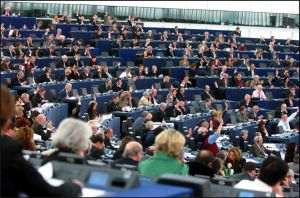The Banking Union represents an important element of the picture of a more integrated and solid European Union, but it does not represent a magical solution for dealing with all the issues of the continent, said Guillermo Tolosa, the representative of the International Monetary Fund in Romania.
The role of the Union is to break the connection that exists between the banking and the sovereign risks, risks which have caused the financial crisis in Europe, he claims.
A weak sovereign authority affects the local banks both on the liabilities and on the assets side, Guillermo Tolosa explained. "A weakened government is perceived as being unable to support the troubled banks, which leads to the increase of their afferent risk, and, implicitly, of the financing cost. Banks also have significant portfolios of sovereign bonds", the IMF official said.
In turn, a weak lender affects the credibility of the local government, because of the likelihood of it needing to resort to the former for help, the representative of the Fund said, and he reminded that while in the case of Ireland, the problems of the banking system have placed the government in distress, in Greece the opposite has happened.
Another factor that makes the banking union needed is the existence of a fragmented banking system on the continent, Guillermo Tolosa added, and he said that all of these factors have a final impact on the non-financial private sector, for which it increases financing costs and reduces the ability to invest in growth.
Common supervision being implemented on a European level has several advantages according to the IMF official, as it consists of a systemic approach to deal with the problems caused by distressed banks, as well as in reducing the risk of the national authorities becoming the "prisoners" of local interests, in order to keep the "zombie" banks alive.
That kind of lenders doesn't exist in Romania, Guillermo Tolosa said, and he added that the IMF has a very good opinion when it comes to the stability of our banking sector.
He went on to say: "The benefits that the Banking Union has for Romania are indirect. Romania has been affected by the import of instability from other European countries. Considering the weight of the foreign capital in the Romanian banking system, the new regulations will allow better supervision of the transnational financial groups".
The Single Resolution Mechanism (SRM) will allow the quicker passing of measures that would prevent the collapse of major banks and the contagion that would occur in the aftermath, according to Guillermo Tolosa.
What is essential to a good resolution of the troubled lenders is the fact that the MUR will have the ability to access a common fund of resources, thus breaking the connection between banks and governments, he said.
The amount available to the fund, of 55 billion Euros, is "a bit small", the representative of the IMF admits, and he said that the Fund would have liked it for the accumulation of the money to happen from the beginning, rather than gradually, and he expressed his hope that there would be no need for more money, in order to cover potential resolution costs.
Even though progress has been made in the building of the Banking Union, the structure still needs work, considers Guillermo Tolosa, who mentioned that the bail-in mechanism needs clarifications when it comes to the manner in which the losses would be absorbed by every category of players involved (shareholders, creditors and depositors).
Another drawback which he has reported was the fact that the funds for the guarantee of bank deposits would remain national structures, instead of taking the form of a European fund.
Nevertheless, the key elements exist which would allow reducing the risk of the problems which Europe has faced in the past beginning again, Guillermo Tolosa concluded.









































